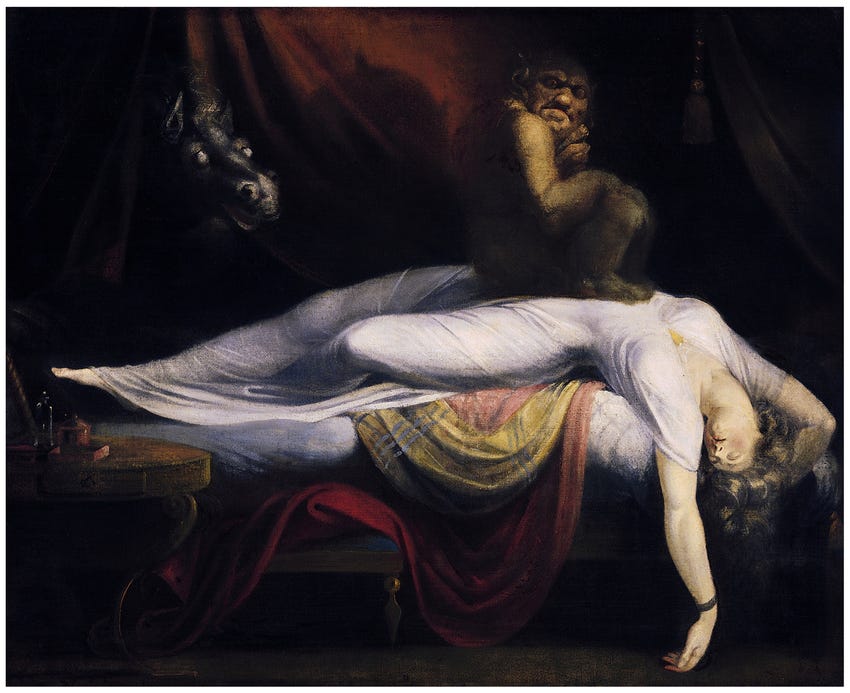Nightwalk
This is part of an early chapter from a book of creative nonfiction I’m working on at the moment on the subject of sleep. I hope you enjoy!
In Kansas we rent an Air B&B a ten-minute walk from downtown. We dub it the “the Dacha.” It’s small, with a sloping roof that has three large leaning windows in it, a loft bedroom, a wee kitchen, a dining room table strewn variously within five minutes of our walking in, and a “work desk” tucked in among bookshelves magnificently stocked. One is accustomed to finding in these spots obligatory collections comprising “it” books of the recent past—the Gone Girls and Cold Mountains and Goldfinchs and so on—but browsing the Dacha is another thing entirely. Three broad furnitures packed with learning and cultivation. We are in the realm of German philosophers and film studies, we are likely Jewish, have read all of Nabokov, etc. I pick up When We Cease to Understand the World by Benjamín Labatut because who can resist that title and encounter almost immediately exquisitely inked marginalia employing the word “concatenate.”
A.’s little sister has undergone an elective surgical procedure and her wife faints at the sight of blood. A. on the other hand, who would never be described as creaturely or morbid, is the kind of person who asks to pop her husband’s zits. Thus the errand. She is here to offer physical support to her sister; I to offer moral support to herself.
Lawrence is a blue dot stuffed with KU academics. It is laid out on a states-and-numbers grid and eminently flat and walkable. The houses are small and tidy, many still decorated from Halloween though we border Thanksgiving week. Neighborhood sidewalks surf trends in geology in a mode charmingly dishabille. Mornings A. will spend at her sister’s house. I encamp at the Dacha in a bathrobe, put on Handel’s Messiah of all things, work through Dr Elizabeth Hunter’s Noctambuli: Tales of sleepwalkers and secrets of the body in seventeenth century England.
Dr Hunter to the best of my knowledge is a postdoctoral research fellow at the Queen Mary University of London. To the best of my knowledge she is thin and has what I think you’d call chestnut hair and a friendly smile and a ruddy complexion. One imagines her cup of tea going cold as she loses herself in a text. She’s in a carrel crazed with texts and she reads with a pen in hand. The tea going cold has become part of her daily plan: it is the tether that keeps her from floating away entirely from the world of living people; she must regularly detach from the text and rise and walk out into the department’s kitchen to use the beastly microwave, dawdling along the way to occupy momentarily the office thresholds of colleagues. While talking to people she wonders about their sleep. She can’t help it. Sometimes she asks. If asked in return she will have to sort through her archive for an appropriate response. There is the matter of her own sleep, which may or may not interest her, but over and beyond that there is the treasury of anecdotes and quotations she’s been at accumulating.
Dreams are “nothing els but a bubling scum or froath of the fancie, which the day hath left undigested” she might say, quoting Thomas Nashe. Or she might invoke Thomas Topsell, who in his Historie of Serpents (1608), while discussing, at great length, dragons, and, in particular, the uses of their fat, has cause to mention that “by the tongue or gall of a dragon sodde in wine, men are deliuered from the spirits of the night, called Incubi and Succubi, or else Night-mares.”
In the light of busybody modernity, we are assured that the monster squatting upon our chests oppressing us in the liminal states bookending sleep is a neurological chimera, a hiccup in routine our prankster brains fashion ghoulish narratives to explain. For my friend Dave it was a figure he’d “wake” to see standing in his doorway or at the foot of his bed, watching. In an early encounter Dave’s visitor wore a Christmas sweater Dave read backwards in a mirror: Leon.
Keep reading with a 7-day free trial
Subscribe to Tallboy Radio to keep reading this post and get 7 days of free access to the full post archives.

